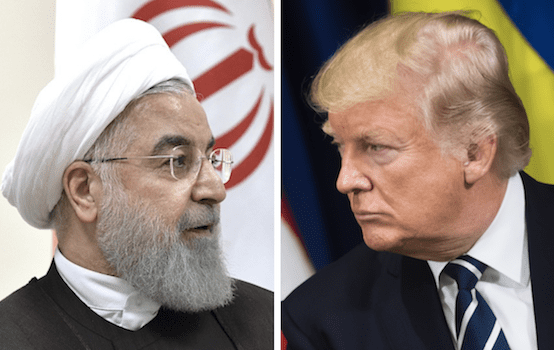How to Deescalate America’s Dangerous Warmongering With Iran

Rhetorical sniping between America and Iran is nothing new. But even within that context, President Donald Trump’s latest remarks are distressing.
“Any attack by Iran, in any form, against the United States will be met with an attack on Iran that will be 1,000 times greater in magnitude,” Trump tweeted on September 14.
His comments, reiterated the next morning on Fox News, did not come out of thin air. A day earlier, Politico had reported on a possible Iranian plot to assassinate the U.S. ambassador to South Africa in retaliation for the American killing in January of Iranian general Qassem Soleimani. The plot was serious enough to garner the attention of South Africa’s State Security Agency. All this comes at a time when U.S. sanctions are hammering the Iranian economy, while the Iranian government continues to insist that diplomacy with the United States is out of the question until Washington returns to the nuclear deal.
While the media is understandably focused on the purported Iranian attack plan, the alleged assassination is only one element of a more alarming story—the U.S. strategy of maximum pressure against Iran over the past two and a half years has transformed an already antagonistic bilateral relationship into an even more hostile one.
Trump administration officials continue to insist the maximum pressure campaign is a resounding success. In terms of economic pain, they may be right. The Iranians are having a devil of a time exporting crude oil. Iranian President Hassan Rouhani said this week that Tehran’s oil revenues have been reduced from $120 billion in 2011 to “just over $20 billion” in 2019, an 83 percent decline. Iran’s GDP will decrease by 6 percent this year. The country is going through its worst currency crisis in recent memory, with the rial having lost 70 percent of its value over the last two years.
Bankrupting the Iranian economy, however, was never the objective of maximum pressure. The stated goal was to compel the Iranian government to come back to the conference room and negotiate a new, more comprehensive agreement on Washington’s terms.
Unfortunately, nothing of the sort has occurred. The Iranians have not only rejected additional talks with the U.S., they’ve been more insistent than ever as they register their objections. On July 31, Iranian Supreme Leader Ayatollah Ali Khamenei called any notion of diplomacy a propaganda stunt and stated that Washington’s sanctions campaign was an attempt to separate the Iranian government from its people. If President Trump genuinely wants to talk with Iran, then the current strategy is counterproductive.
Meanwhile, the International Atomic Energy Agency reported in its latest assessment that Tehran’s stockpile of enriched uranium has increased more than tenfold—a direct response to Washington’s decision to leave the deal in years prior. Thousands of U.S. troops in Iraq continue to be sitting ducks to rocket fire from Iranian-backed Shia militias. General Frank McKenzie, the commander of U.S. Central Command, admitted, “We have had more indirect fire attacks around and against our bases the first half of this year than we did the first half of last year.” It should be noted that the vast majority of these rocket strikes occurred after the killing of Soleimani, an operation supposedly meant to re-establish deterrence against Tehran.
Given the situation, a comprehensive U.S.-Iran agreement may be out of reach at the moment. The best the U.S. can do is to manage its relationship with Iran and ensure that the two countries don’t engage in another dust-up.
Both sides must stop badgering each other with over-the-top public statements about the other’s security vulnerabilities. Remarks that threaten a major war are dangerous on the best of days, but they are especially concerning when the two countries participating in the trash talking have very little diplomatic contact and are already prone to assuming the worst about the other.
The Trump administration also needs to finally accept that Tehran is unlikely to accede to American demands or respond to pressure—economic, diplomatic, or otherwise. Iran is a proud, independent country whose leadership is cognizant of the slippery slope whereby submitting to one demand only enables even more pressure in the future. If the U.S. and Iran are to reenter talks, they will have to start small so as not to blow up the entire process at the start. Any concessions will have to be synchronized so that both are able to save face and sell the talks at home. Qatar’s ambassador to the U.N. has suggested his country could serve as a third-party mediator. Since bilateral discussions would be difficult, President Trump should explore Doha’s offer.
Washington and Tehran aren’t going to be friends anytime soon. But they don’t have to be permanent enemies on the brink of an armed confrontation either. The sooner the two sides deescalate, the sooner they can begin a new period of pragmatic dialogue.
Daniel R. DePetris is a fellow at Defense Priorities and a columnist at the Washington Examiner.